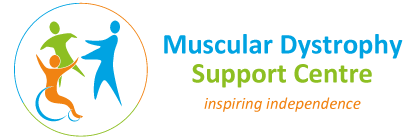In late-onset Pompe disease, unlike the infantile-onset form, there is a low level of GAA enzyme. It can be diagnosed from age one but is also known to present much later in life.
Learn about treatment and tips
 Contact AGSD-UK for a copy of “Pompe – The Inside Story”. This useful range of booklets was developed with Sanofi Genzyme and gives a very good overview of the condition and treatments. All the Highly Specialised Treatment Centres keep copies.
Contact AGSD-UK for a copy of “Pompe – The Inside Story”. This useful range of booklets was developed with Sanofi Genzyme and gives a very good overview of the condition and treatments. All the Highly Specialised Treatment Centres keep copies.
 AGSD-UK has a Pompe Support Team, the PST. Their booklet called “101 Tips for Living Well with Pompe disease” is available free to diagnosed people in the UK.
AGSD-UK has a Pompe Support Team, the PST. Their booklet called “101 Tips for Living Well with Pompe disease” is available free to diagnosed people in the UK.
More details on the “Publications” tab.
Diet and nutrition
Late-onset Pompe disease is a metabolic condition and as such, it is very important to carefully manage diet. Most people will see a dietitian. Hard evidence is limited but it is best to avoid too many carbohydrates such as white bread, rice and pasta. Patients also avoid sweets, cakes and biscuits and follow a “Mediterranean diet’’ instead. Dietitians will make assessments and suggest supplements if they are needed.
Good ideas to try are often discussed at AGSD-UK meetings and conferences. Here people exchange their own experiences and what has worked well for them. Varying the time of food eaten during the day can help to manage energy levels.
Another topic often discussed at meetings is digestive discomfort and symptoms similar to irritable bowel syndrome. Some people report bowel urgency, flatulence or constipation. Others report bladder urgency and seek help from a continence service for this.
Maintaining a good weight for your build will be something your dietitian discusses with you. Special protein drinks are sometimes prescribed to help gain weight. A blend of good diet and tailored exercise is recommended.
Physiotherapy helps
The purpose of physical therapy is to ease symptoms, maintain the abilities you have as much as possible and help prevent unnecessary damage to your muscles. A phyiostherpist with experience of Pompe disease will be able to give you good advice about managing your fatigue and balancing physical demands on your body.
A specialist neuro-muscular physiotherapist will see patients about every six months and conduct a series of monitoring checks including a 6-minute walking test.
Many patients also see a local physiotherapist though it is important to check that they understand this very rare neuro-muscular condition because incorrect advice can cause long term damage.
Hydrotherapy can be very beneficial because the warm water helps to ease muscle aches and aids more exercise.
This topic is usually included in AGSD-UK annual conference with an expert speaker. Members living with Pompe disease have also written about their experiences with physiotherapy in our newsletter. Look through Glisten for articles on exercise and sports.
Two independent centres in the UK offer specialist help and have seen many people with late-onset Pompe disease.


Building emotional resilience
Coming to terms with a serious diagnosis is something everyone will face in their own way. If you would like more advice speak to your clinical psychologist who may be able to help refer you for more ongoing counselling. The Specialist Care Advisor might also be able to put you in touch with someone local to you for help. Most areas offer free classes based on cognitive-behavioural therapy (CBT) and this could be the right solution for some people.
Feelings of loss and grieving are also common, normal reactions. Late-onset Pompe disease is very rare, so it can be hard to explain it to others do not understand. This too causes feelings of isolation and sometimes, loneliness.
Fatigue plays a large part in feeling down and low. Fatigue, often crushing tiredness, can lead to limitations on life, choices and social outings. Everyone with Pompe disease notices how many adjustments have to be made every day to manage life with this condition. Difficulty breathing and low oxygen levels might also contribute to feeling drowsy and vague. This in turn leads to feeling down. It is important to ensure you have the best possible physiotherapy, diet and breathing support because these might help you feel a lot better.
Living with Pompe disease requires continued self-management, especially in finding the right balance between activity and energy levels. The Borg Scale is something that might help you think about how you do not overdo things. Getting so tired that you need a day in bed to recover should tell you that you have done too much.
Be your own advocate
This has become something of a mantra for meetings and get-togethers of people affected by Pompe disease.
What they are saying is basically that your best helper and supporter is yourself. Friends and family provide enormous amounts of loving care, practical help and kindness and no-one manages without them, nor wishes to.
The Pompe Support Team created a useful Medical Overview booklet for professionals. Obtain a copy to pass on to your GP or Dentist to help them understand how to provide the best care for you. The booklet was created in response to many people saying they got tired of continually explaining their condition.
More details of the “Medical Overview” booklet.
Information and knowledge are empowering. Getting informed is the best way to learn about how to make the right choices for you.
